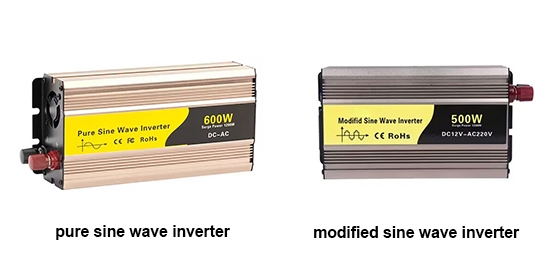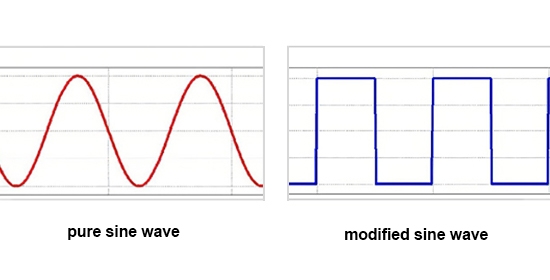Power inverters can be mainly divided into two types according to waveforms: pure sine wave inverter and modified sine wave inverter. When it comes to choosing the right inverter for your needs, understanding the differences between pure sine wave and modified sine wave inverters is crucial. These devices are essential for converting direct current (DC) to alternating current (AC), which powers most household appliances. This article will discuss in detail the difference between pure sine wave and modified sine wave inverter.

Definition:
A modified sine wave inverter is a type of power inverter that converts direct current (DC) from sources such as batteries or solar panels into alternating current (AC) electricity. In modified sine wave inverters, the polarity abruptly switches from positive to negative. When looking at the wave, it has a stair-step, square pattern, where the polarity is flipped back and forth. The AC output produced by these inverters is not a true sine wave but rather a waveform that steps in discrete levels, approximating the shape of a sine wave. This type of waveform is more efficient to generate and less costly than a pure sine wave, making modified sine wave inverters a popular choice for many budget-conscious applications.

A pure sine wave inverter is an electrical device that converts direct current (DC) from sources like batteries or solar panels into alternating current (AC) that mimics the smooth, sinusoidal waveform of grid electricity. Unlike modified sine wave inverters, which produce a stepped approximation of a sine wave, pure sine wave inverters generate a clean, smooth wave that is identical to the AC power supplied by utilities. This makes them ideal for sensitive electronics, medical equipment, and devices that require a stable and consistent power supply.
Advantages:
A modified sine wave inverter offers several advantages, particularly for budget-conscious consumers and those with less demanding power needs. One of the primary benefits is cost-effectiveness; these inverters are typically less expensive than pure sine wave inverters, making them an attractive option for those looking to save money. They are also simpler in design and construction, which can translate to higher reliability and longer lifespan in certain applications. Furthermore, modified sine wave inverters are capable of powering a wide range of household appliances, power tools, and electronic devices, making them versatile for many everyday needs.
Another significant advantage is their efficiency in converting DC to AC power, which can be particularly beneficial in off-grid and mobile applications, such as in RVs, boats, and remote locations. Their compact size and lightweight nature make them easy to transport and install, adding to their convenience. While they may not be suitable for sensitive electronics that require a pure sine wave for optimal performance, the modified sine wave inverter's combination of affordability, reliability, and versatility makes it a popular choice for many practical applications where high precision is not a critical requirement.
A pure sine wave inverter offers several advantages over modified sine wave inverters, making it a preferred choice for various applications. One of the primary benefits is the clean and stable power output it provides, closely replicating the quality of electricity supplied by the grid. This results in efficient and reliable operation of sensitive electronic devices such as laptops, medical equipment, and sophisticated home appliances, which might otherwise malfunction or suffer damage when powered by modified sine wave inverters. The smooth and consistent power delivery also helps in reducing noise and interference in audio and video equipment, ensuring superior performance and longevity of these devices.
Another significant advantage of pure sine wave inverters is their ability to handle a wider range of inductive loads, such as motors and compressors, more effectively. These inverters ensure that such equipment starts smoothly and operates efficiently without overheating or experiencing undue wear and tear. Additionally, pure sine wave inverters are known for their energy efficiency, which translates to lower energy consumption and reduced operational costs in the long run. This efficiency, combined with the high-quality power output, makes pure sine wave inverters an ideal choice for both residential and commercial applications, where reliability and performance are paramount.
Application:
Modified sine wave inverter:
- Basic Appliances: They can power simple household appliances like lights, fans, and small kitchen appliances.
- Power Tools: Useful for operating power tools like drills, saws, and grinders, especially in a workshop setting.
- Solar Power Systems: They can be part of a solar power setup, where they convert the DC power from solar panels into AC power for household use.
Pure sine wave inverter:
- Sensitive Electronics: Devices like computers, medical equipment, and advanced audio/video equipment require the consistent and clean power provided by pure sine wave inverters. Fluctuations or "dirty" power can cause malfunctions or damage sensitive components.
- Renewable Energy Systems: Solar power systems and wind turbines often use pure sine wave inverters to convert the harvested DC power into usable AC power for homes and businesses. This ensures compatibility with grid power and household appliances.
- Telecommunications: Telecommunication systems, including cellular base stations and emergency communication equipment, rely on pure sine inverters to ensure reliable and uninterrupted operation, which is crucial for maintaining communication networks.
- Uninterruptible Power Supplies (UPS): Pure sine wave power inverters are integral to UPS systems, providing backup power during outages. They ensure that critical systems like data centers, medical facilities, and security systems continue to operate without interruption.
- Recreational Vehicles (RVs) and Marine Applications: These inverters are used to power a variety of onboard electronics and appliances, providing a seamless and efficient power supply in mobile and marine environments.
Understanding the differences between these two types of inverters helps users make informed decisions based on their specific requirements. Inverter Store has different power inverters to choose from. Whether investing in a pure sine wave inverter for sensitive electronics or opting for a modified sine wave inverter for basic power needs, knowing the strengths and limitations of each type ensures that users can select the best solution for their energy systems.
